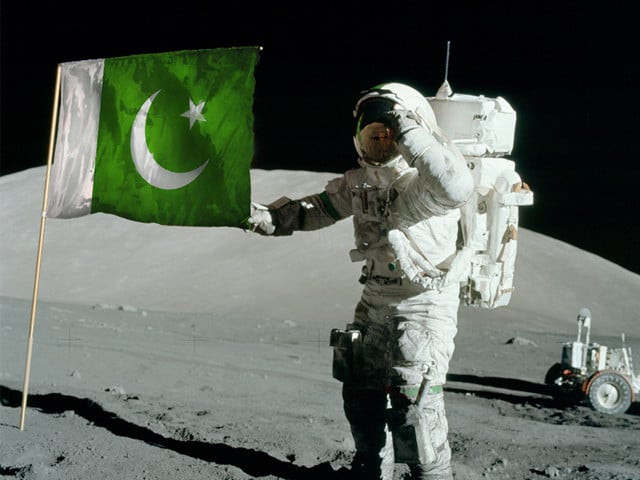August 2023 is destined to host two full moons. The super moon will light up our planet on August 31st, as it did at the beginning of the month. And as the world waits to welcome its second sighting of the complete lunar disc, India celebrates having seen it three times this month, a feat like none other.
Congratulations are definitely in order. Let me raise my glass of thandi lassi to our neighbours. Cheers to the people who are working hard and competing on the world stage, unlike some of us who can't seem to get out of the Toshakhana, the infighting, religious hierarchy, delusional and misguided superiority, tearing down minorities, burning churches, etcetera, etcetera, etcetera.
Yes, India is certainly not rinsed in milk (or as is colloquially said, it is certainly not doodh ka dhula), but clearly its people have their priorities in perfect alignment under their tri-coloured flag. Yes, the devil is in the detail, and one can talk about much wrong in the past and present, but that's everywhere and not our point of reference today. Their institutions, such as the governing body, soldiers, cricket, tech, film industry, democracy and much more, can hold its own. To draw a comparison Sarmad Khoosat's Zindigi Tamasha was canned in Pakistan due to pressure from entities that are to remain unnamed, but Shah Rukh Khan's Pathaan was released to a full house despite the ridiculous uproar, calling for its nationwide ban, pre-release and after.
A country of almost 358 million in 1947, our neighbour, historically speaking, was always taught to be country proud. That was taught post-independence. Hence, ethnicities were never encouraged or referred to as Parsi, Muslim, Hindu, Punjabi, Sindhi, Pathan, Upite, Tamil; they only called themselves Indians.
In his book, titled The Discovery of India, Jawaharlal Nehru explained the very concept of “unity in diversity”. Divide and rule doesn't make successful nations. Our beloved Jinnah and Nehru won independence for their countries together, but tragically for us, the wonderful and patriotic Quaid died, and the vacuum was filled through quick changes by quasi-leaders planted by powers that be. Meanwhile, Nehru lived for another 16 years to sow the seeds of real democracy and success that India reaps today.
Nehru coined the term “temples of modern India” to describe scientific research institutes, steel plants, power plants and dams being launched in India after independence to jumpstart scientific and industrial progress. Education became the benchmark for equality. It wasn't that money made a great equalizer, but education did. Continuing those policies, Indira Gandhi abolished feudalism, an archaic system that does not work with modern governments and is diametrically opposed to progress for all. Imports were banned, Indians ate homemade chocolate, cheese and cola and drove a car that was manufactured locally.
Enter modern times and almost the turn of the century. Fifty years into independence, Vajpayee is in power, a different party but he keeps his eye on the ball of progress and education. That's how one gets to the moon and back. For nations to achieve great progress, the current generation has to stand on the shoulders of the bygone leaders who keep the country above parties, institutions and individuals.
According to Teenaz Javat, an Indian friend of mine who moved to Pakistan in the 90s after marrying a Pakistani, and has experienced living in both countries:
“The makers of modern India put religion on the back burner. With science up front, we are now on the moon”
Being a country-loving Pakistani is a responsibility that we, collectively or individually, cannot shirk. We need to be the voice that wants to yell from tall buildings at the top of our lungs, but somehow, we find ourselves as desperate and pathetic characters in the movie A Quiet Place. Quiet, scared, fearful, petrified!
Our voice is lost in the comatose phase of “Shhh, koi soon lay ga (people will hear)”.
What's up, countrymen? Do you want to compete on the world stage, or do you want to keep being beaten down all the time?
As I sit and ponder the root cause of us being where we are today, only one thing explains it. We never gained independence from the colonists. They left a legacy behind of red coats, descendants of holier-than-thou religiosity, elitism and feudalism (dukedoms, earls, marquis, lords, ladies, and at the top of the food chain, a king who wants it all).
Like it was in the European Middle Ages, it is in the interest of our misguided legacy holders to keep the population uneducated and always desperate for the next meal. Their desperation ensures that they only focus on acquiring a resource that leads them to the next food source and water, let alone security, housing, education and a quest for a better life. And advancement, improvement, development, research, science, technology, energy, a network of business and telecommunication, roads, railways, travel and tourism are buzzwords left to appear in ministers' portfolios, only to be aspired for and never to be reached.
As a Pakistani, don't you sometimes want to win?
Don't you want to wake up in the morning and read a happy, positive headline that makes you proud? Where are those headlines? Where did they go?
They went to the A Quiet Place it seems.
As a kid growing up in Pakistan, during the early 80s, I remember going out after sunset on Independence Day to see the lit city of Karachi dressed like a beautiful bride: bright, beautiful, vibrant and full of promise.
Where did that promise go?
Today, I felt a pang, and while I'm happy for our neighbour, I did feel regret that we as a nation have been conditioned not to aspire for much, let alone for the moon.
What's left for me to say when Raees Farogh said it best in his sublime poetry:
Anokha laadla,
Khelan ko maange chaand re,
Anokha.
Kaisi anokhi baat re.
Anokha.
My wondrous darling,
Asks to play with the moon,
Wondrous.
What a wondrous strange thing it is.
Wondrous.



COMMENTS
Comments are moderated and generally will be posted if they are on-topic and not abusive.
For more information, please see our Comments FAQ